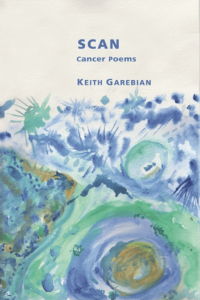By Blaine Marchand
Scan: Cancer Poems
by Keith Garebian
Dis/ability Series: Number Twenty-two
Limited Edition, 100 copies
Frog Hollow Press
In the opening to Keith Garebian’s probing, insightful and powerful chapbook, “Scan,” there is a quotation from W.H. Auden’s long poem The Sea and the Mirror- “perhaps by the time death pounces/His stumping question, I shall just be getting to know/The between moonshine and daylight…”.
When diagnosed with cancer – throat cancer in Garebian’s case – a person is suspended between disbelief and acknowledgement, between medical technology and the ordinariness of everyday life, between despair and hope, between death and life. As Garebian writes in the opening poem, “Scan”, where he lies as his body, clad in a thin sheaf of blue hospital gown, is mapped, “Heat licking neck and head/two body parts/become strangers from what I was”.
Cancer is a terrifying voyage of discovery. In “Illness as Metaphor”, he rightly concedes that cells within us “can’t be ignored” and that confirmation of the disease brings its own guilt as the patient and well-intentioned friends, just as Freud did, try to determine the underlying cause of it. This often results in the patient being blamed – “Such illness…is shameful – passion repressed or punished”.
The patient is immediately plunged into the conundrum of medical terminology. In the witty and perceptive poem, “I Am a Body”, he undercuts jargon, such as nasopharynx, extracapsular extension, calcified granulation and osteophyte fibrosis with wry observations and commentaries, “the body having turned from friend to foe.” And finally in it, he concludes: “Disease and its discontents/leading to insights:/I don’t have a body/I am a body, self/and encumbrance together.”
Being a poet, Garebian, rather than falling into silence, embraces words as a intercession, a way of undoing things. His poems do not refuse death. They are “a measure of how we die/when death possesses our imagination.”, as he writes in “Intervention”. Rather than allowing the disease to make him a foreigner to himself, as he writes in Crosswords, he searches “for some better place/which will love you/back for what you wish/to survive, a cure”
What makes this chapbook so compelling is its startling use of imagery. For example, in “Death’s Heavier than Syntax”, he layers and contrasts images of a hog screaming as it is butchered, an impala’s hooves kicking feebly as it is brought down and the thoughtless act of a fly smudged by his hand. He probes the ups and downs of the stages of treatment with a sharp, observant intellect and percipient turns of phrase.
This collection clearly shows Garebian’s command of language as he delves into the many emotions that cancer brings to the surface – trepidation, uncertainty, doubt, but ultimately, hope, of which we must never let go. In the final poem, “Glossa: Hope, A New Skin”, he uses lines from a poem by Barry Dempster, who has known his own illness: “hopes for new/skin to grow over the open flesh, perhaps/a skin that insulates the soul.”
Whether for someone who has cancer, someone who loves one with cancer or simply anyone who enjoys fine word play and depth, “Scan” is highly recommended.
Blaine Marchand was diagnosed with laryngeal cancer in 2015 and wrote a series of poems, Finding My Voice. His seventh book of poetry, “Becoming History,” has just been published by Aeolus House.


